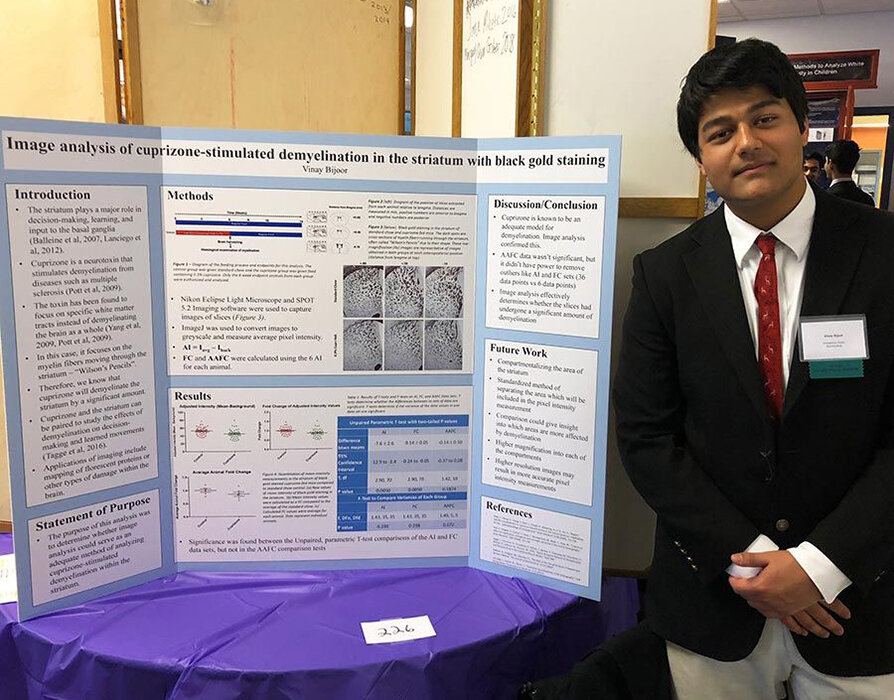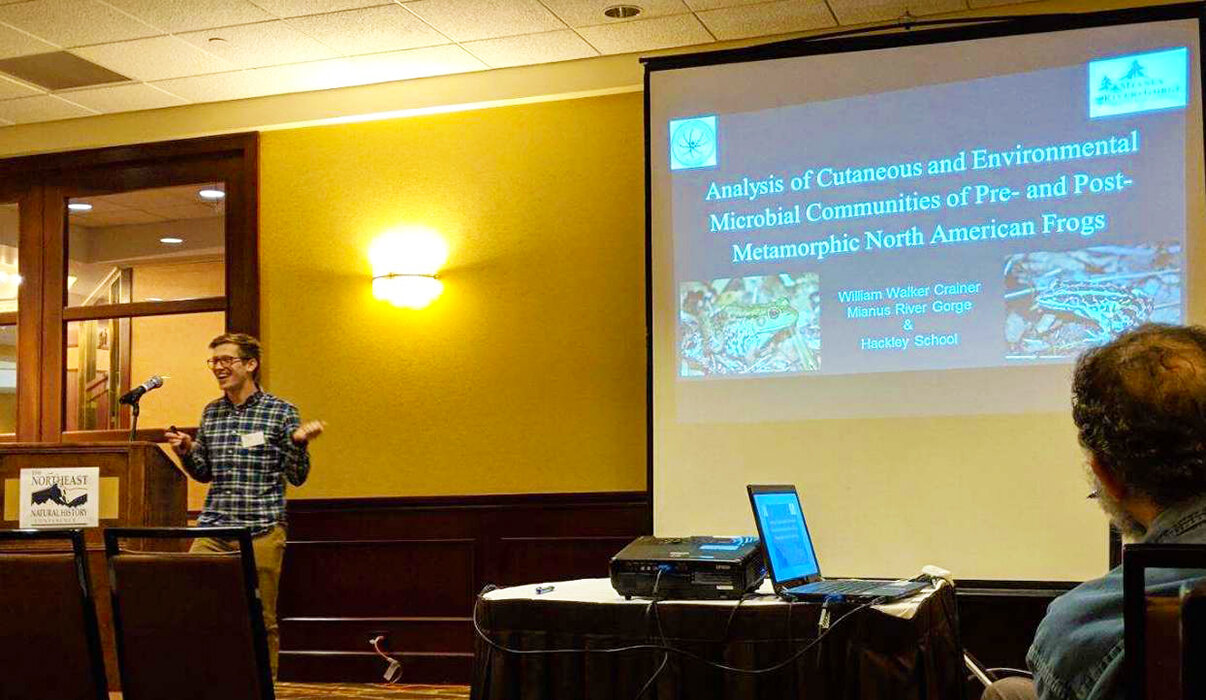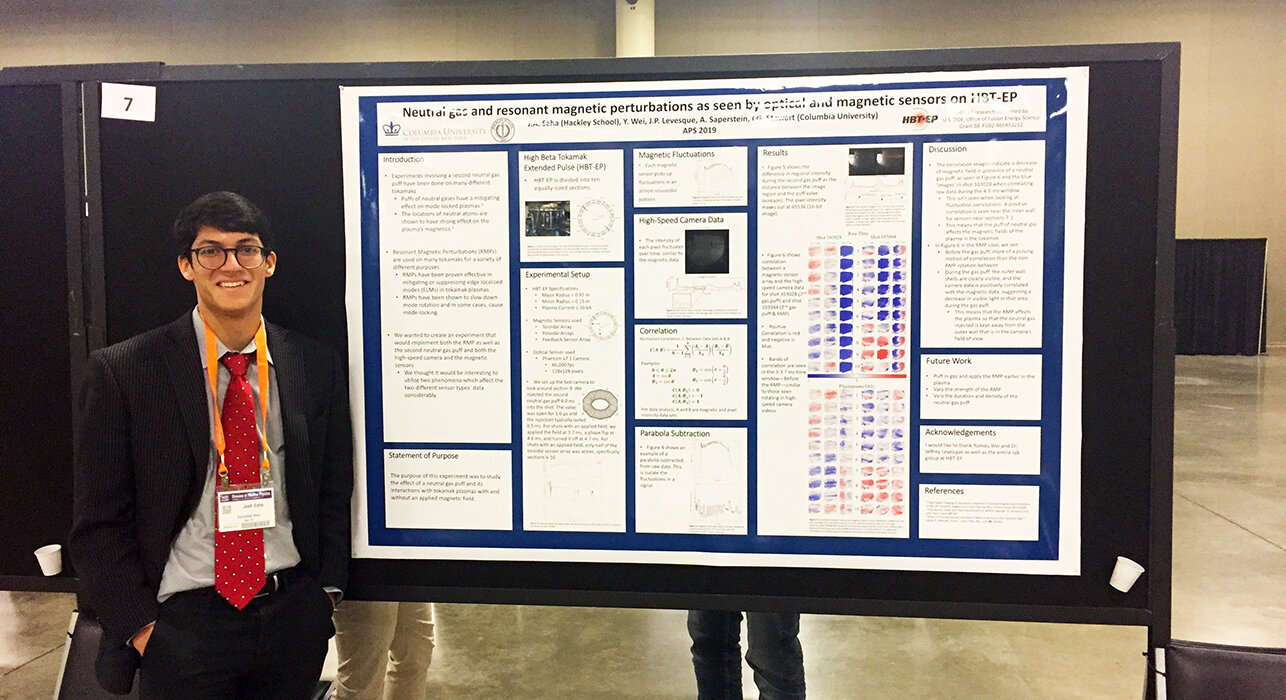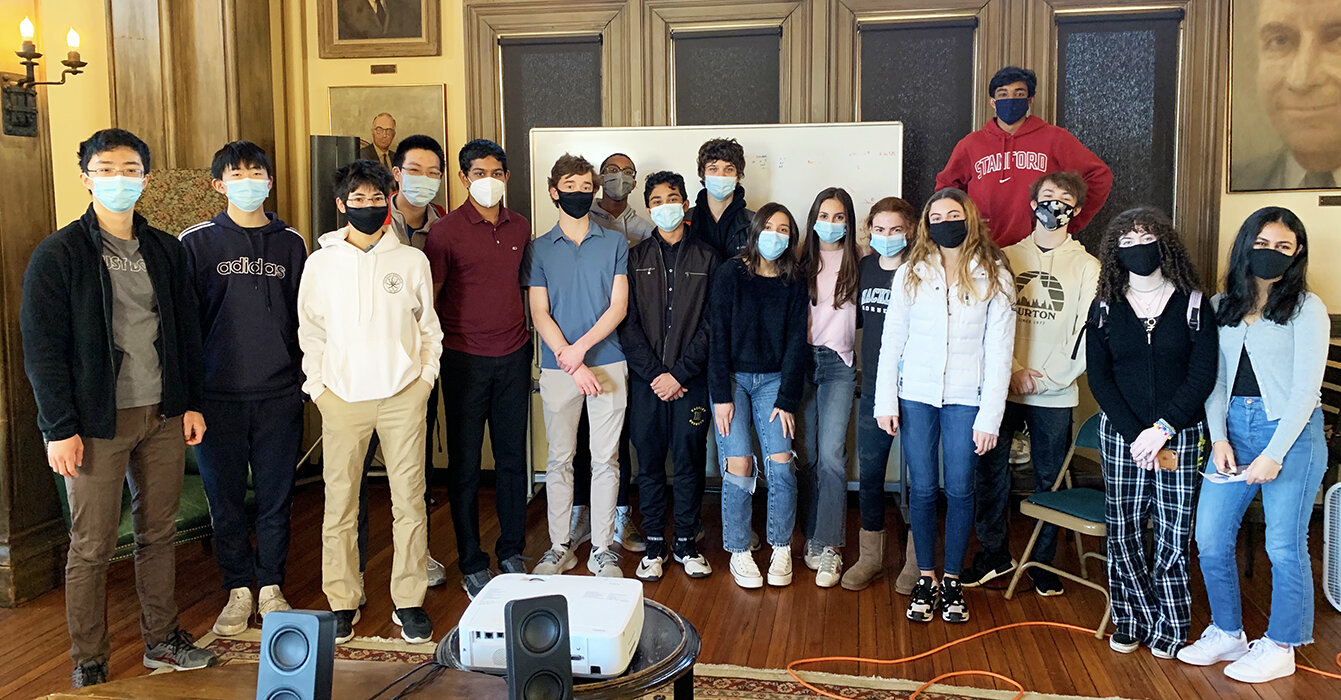Hackley’s Independent Research Program
By Andrew Ying, Upper School Science Teacher & Coordinator of Independent Research
Dr. Andrew Ying, Upper School Science Teacher & Coordinator of Independent Research
I remember starting at Hackley about a decade ago and being immensely impressed with the scientific curiosity, enthusiasm, and initiative that my 9th grade Physics students expressed each day. At the time, students like Wenkai Qin ’14 and Jules Oppenheim ’15 applied for a variety of summer science internship programs to no avail. I was surprised to learn that these incredible students were rejected by these summer programs. It became increasingly important for me to find ways to do more in support of our science research-oriented students; if our athletes and musicians had a venue to explore and perform their passions, then so too should our future scientists. I vividly remember my excitement after the late Headmaster Walter Johnson and Director of the Upper School Andy King asked me to pursue my idea of a research program. A year later, the Independent Research Program (IRP) at Hackley School was born.
Fundamental to their long-term success, the goal of the IRP was (and still is) to enable students who are passionate about science to pursue high-level, authentic scientific research in any field of their choosing. The program encountered many challenges in its earliest days including how we would provide space, time, and other resources for each student to pursue their studies.
After all, how could the school provide state of the art equipment for students with varying degrees of interests when one person may want to research the next treatment for cancer or Alzheimer’s while another wants to pursue plasma physics and another is interested in desktop-sized micro-satellites? Incidentally, these were the projects of the IRP’s first four students. Our students aim for the stars, and who are we to tell them their goals are too lofty? To address these challenges, students partner with off-campus mentors and research facilities to carry out their experiments.
When most people envision scientific research, they are flooded with images of scientists in lab coats mixing chemicals, or peering into microscopes or telescopes. However, that is just one, albeit important, facet of scientific research. All research, regardless of the field, starts with reading and understanding what studies have been done in the past. Based on literature review, new experiments and tests can be designed so that the “experiment” can be carried out. There is then data to be analyzed, results to be inferred, all of which must be communicated to the public or scientific colleagues. In our goal of enabling students to pursue scientific research, we aim to teach them about these other equally important aspects of the research process.
The IRP ultimately expanded into a major course offering for students in their sophomore to senior years. In our inaugural 2015-2016 school year, four sophomores entered the program. As with all new programs, the first few years of IRP involved tough growing pains, including students dropping out and concerns about the future of the program. Still, the program persevered.
Vinay Bijoor ’18 was the only student from the inaugural class to complete all three years, conducting a research study investigating the stimulated demyelination (insulating layer around nerves) in the striatum (part of the brain that regulates motor function) in a mouse model for Multiple Sclerosis. In completing his work, and despite losing his mentor in his second year, Vinay learned to design and conduct a study involving mouse models, and image and statistical analysis. He was also able to present the work at the Westchester Rockland Junior Science and Humanities Symposium (WR-JSHS).
William Crainer ’19 partnered with a mentor from Virginia Tech to investigate cutaneous and environmental microbial communities of pre- and post-metamorphic North American frogs. William collected microbial swabs of over 200 frogs and tadpoles during an intensive two-week period at Mianus River Gorge each summer, and he helped to create the data tables that were ultimately used to cumulate the data that he and his mentor used. His work won 2nd place at the WR-JSHS, and he was invited to speak at the Northeast Natural History Conference, the largest regional forum for re[1]searchers, natural resource managers, students, and naturalists to present current information on the varied aspects of applied field biology (freshwater, marine, and terrestrial) and natural history for the Northeastern United States and adjacent Canada.
Josh Saha ’20 spent his sophomore and junior summers working on a project at Columbia University’s HBT-EP plasma physics laboratory on a project that showed the correlation between a high-speed camera and local magnetic sensors in a tokamak (a magnetic confinement device for producing controlled thermonuclear fusion power) when a neutral gas is injected into a stable plasma. The project culminated in Josh presenting his work at the 61st Annual Meeting of the American Physical Society - Division of Plasma Physics on Tuesday Oct 22, 2019. This is the largest meeting of Plasma Physicists in the world, and he was the sole high school student presenting his work at their poster fair. Similar to Will, the metric of success of IRP is not that Josh was invited to speak at an international conference, but rather the journey and learning experiences that Josh had. “IRP allowed me to research nuclear fusion and plasma physics, topics never covered in high school. Scientific research, while possible to do outside of IRP, became very accessible through IRP and very understandable with Dr. Ying’s help. And beyond just nuclear fusion and plasma physics, through my internship I was able to learn how to solder, how to design circuits, how to program in MATLAB, and I was able to go to Florida [to present my work].
The most daunting and challenging part for the students in IRP then and now is not the high-level research they are investigating, or finding the time to pursue it, but it is finding the mentor and research lab to work in. Students reach out to professionals in their respective fields (doctors and research scientists) and convince the potential mentors that they should take the risk to mentor our students. What they learn, aside from the science, are the vital “soft skills,” such as resume and cover letter writing, that prepares them with the communication skills necessary to apply for future jobs, and with the confidence to interact with topics and people at high levels in varying scientific professions. Ava Troso ’23 “used to get anxious whenever I had to call a medical professional to ask about their research, experiences, and the opportunity for them to mentor me in my own research. But now, I call medical professionals with ease, and in fact, I prefer it over an email.
Beyond individual research studies, a cornerstone of IRP is the opportunity to connect today’s students with alumni and friends of Hackley through our Guest Speaker Series. Alumni and friends have returned to the Hilltop to describe their research, ranging from modeling of acoustical systems to immunotherapy for cancer research. While our students are fascinated by the cutting-edge research that is described, the life experiences and advice that are offered to the students is what makes these visits so powerful. Lily Napach ’21 finds that “after almost every guest speaker, I leave class wanting to learn more about what they do whether it be cancer immunology or ophthalmology and…I am inspired to pursue a similar career path. Dr. Prescott was a particularly meaningful speaker to me. Her perspective on the value of an MD/PhD was inspiring and makes me want to pursue that path.” Our students form deeper connections to science from these visits, and we are forever grateful to each of our visitors. (see a list of our impactful speakers on our website.)
The IRP is where students get to independently pursue their passions. Where Dionne Chen ’22 can explore the psychology of mental illness and anxiety. Where Akshi Khowala ’23 can “pursue a particular science topic that would not necessarily be taught in a traditional class setting.” And where Lily Napach ’21 can connect with peers who are equally passionate about science on topics such as quantum mechanics, Huntington’s disease, or subarachnoid hemorrhages. Jinlin Cai ’22 wrote: “The best part of IRP is the motivation I see driving every student every day. At its core, it’s a course that belongs to the students fueled by the students’ passion. I come to class to be a part of a community of people who truly love, nay are obsessed with what they study. It is a family of people who love different things which forged the perfect academic community.”
In 2015, the IRP launched with four students. Five years later, we have grown into a program of 19 students, with more applicants to the program every year. Our students have worked on projects in a variety of fields spanning from biological to physical sciences, collaborating with scientists locally, nationally, and overseas. The IRP in science inspired another research program at Hackley—the IRP in English and History. Together, these research programs support a key pillar in Hackley’s strategic plan Redefining Excellence: Learning Beyond Boundaries, to “Redefine a Liberal Arts Education.” It is an exciting time as this program continues to grow. All of this success has been possible because of the dedication and motivation that our Independent Research Program students (our future scientists) demonstrate each day.
Left to Right: Vinay Bijoor ’18 presents his work at the Westchester-Rockland Junior Science and Humanities Symposium in the Winter of 2018. William Crainer ’19 was invited to speak at the Northeast Natural History Conference in the spring of 2019Josh Saha ’20 presents his work at the 61st Annual Meeting of the American Physical Society - Division of Plasma Physics in the Fall of 2019. 2021 Independent Research Program students.
Independent Research Program Information
Philosophy
A traditional high school science curriculum focuses on theories and concepts that have been established by the scientific method tens to hundreds of years ago. Often, the theories are presented as scientific “fact” while the rigorous and exciting process in which they became prevailing theories are overlooked. Yet scientific research is a collaborative process in which hypotheses are constantly tested and revised based on the outcome of experiments. The Independent Research Program at Hackley was designed to bridge this gap, so that our high caliber, enthusiastic, science students can develop the skills and experiences necessary to pursue scientific research careers with confidence.
Description
The Independent Research Program at Hackley provides students with a passion for science the opportunity to participate in authentic scientific research in a genuine setting. This three-year program is designed to give students first-hand experience in conducting research, thus bridging the gap between a traditional high school science curriculum and the process behind real-world scientific discoveries. Students accepted into the program spend each summer after sophomore and junior years working closely with research scientists to conduct self-designed experiments, either in academic, medical, or industrial labs. The program culminates with the students submitting their results to regional, national and/or international science and engineering fairs.
Approach
Students apply to the program during their freshman year and are evaluated on their academic accomplishments and essays that demonstrate their passion for science. The program accepts students who are rigorous in their work, curious, and highly motivated in their pursuit of completing scientific research. They are eager to dedicate 6 - 8 weeks of their summer to conduct authentic and novel experiments, which will be formative for their future careers as scientists. Students prepare for the challenges of conducting research during their sophomore year by learning foundational skills such as performing proper literature reviews, reading and analyzing data, and presenting results. The program aids students in identifying and contacting potential mentors at universities and research facilities. Once a student has paired with a mentor, they work together to design an experiment to be carried out over the summer. Ideally, the mentor and student find the experience mutually rewarding, so they can continue working together throughout the academic year in preparation for future experiments during subsequent summers.
Volunteer
Our students enjoy learning from our alumni. If you are an alum actively involved in research, please email Dr. Ying at aying@hackleyschool.org to schedule a visit.




